Flatulence has long been a source of great fascination and entertainment to children and adults alike. But what about our feathered companions – can birds fart? In my search for information on this subject, I had no idea of the trail it would unearth. Come with me on a journey into the world of bird farts to finally cut the cheese and expose fascinating truths and tantalizing urban myths.
The common scientific consensus is birds cannot fart. Their digestive systems work so efficiently that food does not have time to ferment and cause gas. The Bassian Thrush was observed in 1983 making a noise similar to a jet of air from its vent (anus) but this behavior has not been recorded since.
Is the Bassian Thrush story a myth, or do these birds actually pass wind? Continue reading to find out and also learn more about the digestive habits of birds than you ever wanted to know?!
Why Did My Bird Fart?
Chances are – it didn’t. I’m sorry to tell you but if you heard a slight fluff from the vicinity of your Budgies cage you are either hearing things or need to make sure it wasn’t you. Either that or blame the dog! Birds’ digestive systems are just not built for farting.
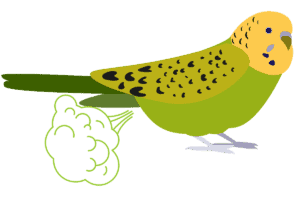
The Digestive System Of A Bird
Birds have an esophagus just like we do, however, the esophagus in some birds contains an enlarged section called the Crop. The Crop is basically a “pouch” where food is stored to be digested later or regurgitated to feed their young. From the Crop, food is moved on into the first of two stomachs.
Birds have two stomachs, the Proventriculus and the Gizzard. The Proventriculos breaks down food with acid that can have a pH as low as 0.2 (human digestive acid is between 1.5 and 3.5). This is necessary as birds are unable to chew their food and in many cases have to swallow it whole.
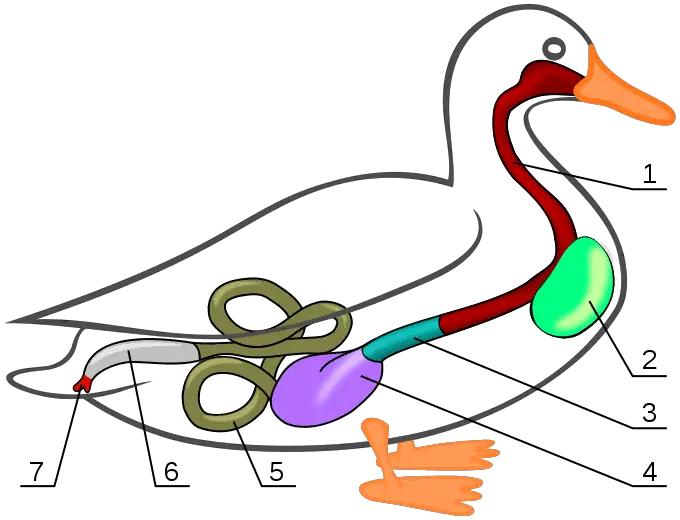
2. Crop
3. Proventriculus
4. Gizzard
5. Small Intestine
6. Large Instine
7. Cloaca
Gastrointestinal_track_of_the_Mallard-Uklad_pokarmowy_krzyzowki.JPG: Olga007derivative work: Malyszkz, CC BY-SA 3.0 https://creativecommons.org/licenses/by-sa/3.0, via Wikimedia Commons
The Gizzard is a very muscular, disc-shaped stomach that grinds up tough food. Sometimes birds will swallow small stones that remain in the Gizzard to help grind up food.
From the Gizzard the food moves into the intestines where the nutrients are distributed into the birds’ bloodstream.
At the base of the digestive system is the Cloaca. This is where waste from the digestive and urinary tracts is accumulated before being expelled.
This whole process takes place in around 45 minutes for small birds and up to 6 hours for the likes of an Ostrich. As digestion happens so quickly, there really is no time for any large build-up of gases that might contribute to a fart.
Birds get rid of any gases as quickly as they do the other material in their guts, and so there really isn’t time for huge buildups of the kind that 10-year-old children (of both sexes, in my experience both as a former kid and as a former teacher) delight in and squeamish, oh-so-proper adults (again, of both sexes) recoil from.
Laura Erickson
Discover why birds should not eat bread in this article on my site.
Do Birds Burp?
If birds don’t fart, can they burp? I mean, we’re talking about a completely different orifice here so isn’t it possible?
There is one bird that can burp. The Hoatzin found in the Amazon and Orinoco Basins in South America has a digestive system similar to that of a cow. Plant material is fermented in a multi-chambered crop (an area in the esophagus), which produces gases which means that they most likely burp!
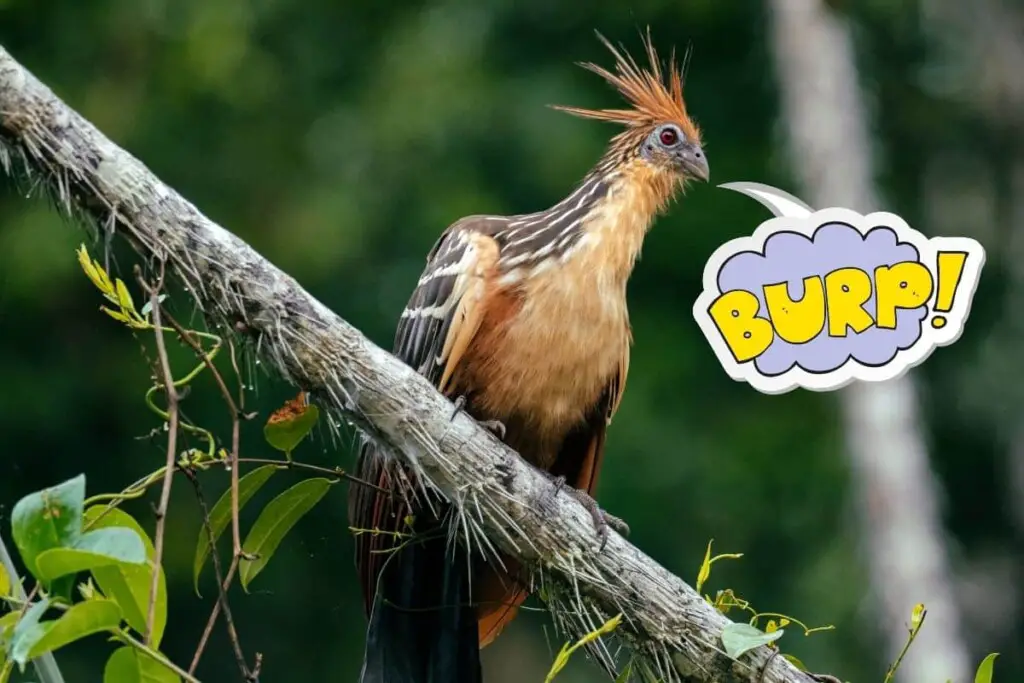
If they do burp, it certainly would not be the same as the loud, rumbling emissions we humans produce. The Hoatzin has earned the nickname “stinkbird” due to the foul-smelling vapors it breathes out – it smells like poo!
It’s disappointing, I know. Please let me know if you do ever hear a bird let out a loud burp.
Discover 10 mind-blowing birds of South America in this article.
The Bassian Thrush Bird Fart
Bassian Thrushes are a mottled brown to olive-brown Australian bird, about the same size as a Blackbird. I used to photograph these beautiful birds a lot in Gembrook, Victoria.
Between February 1981 and February 1982, a South Australian Ornithologist by the name of J. S. L. Edington conducted a study of the White’s Thrush as it was known at that time. In his article from the South Australian Ornithologist, Volume 29 he stated that he had sighted the bird 29 times during 97 visits to the 70 ha study area in the Kuitpo State Forest.
He recorded “a noise similar to a jet of air and somewhat louder (clearly audible at five meters and lasting less than 0.25 sec.) than the bird’s footfalls was produced immediately after stopping and was in turn, followed by probing or more hopping.”
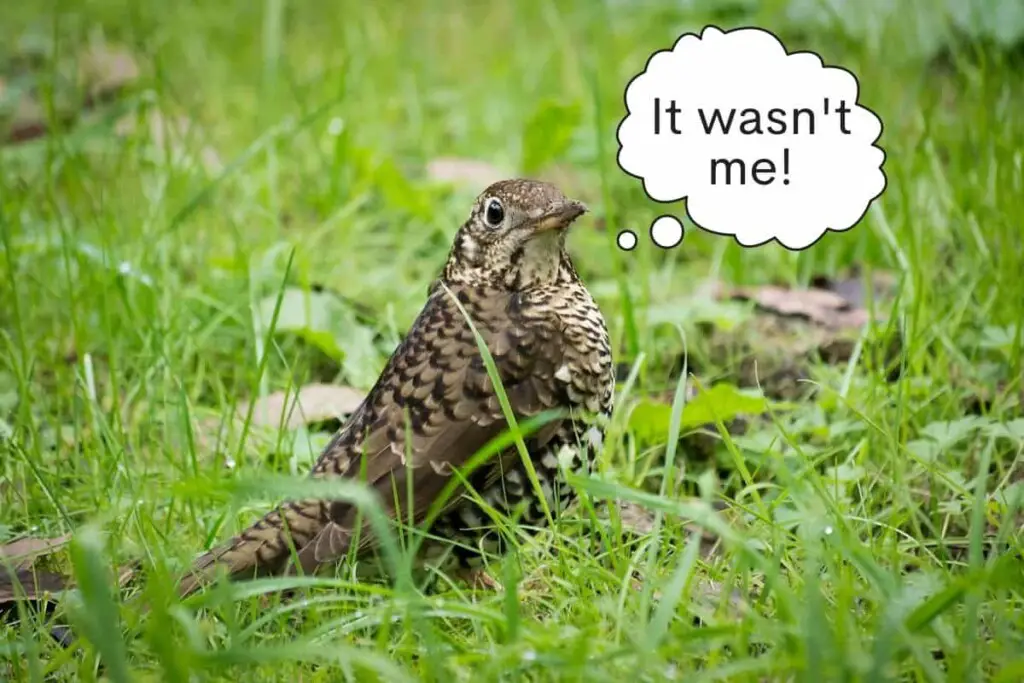
He also noticed when the bird made this noise, “a distinct downward movement of the vent region (‘vent-dipping’), very similar to the movements of defecation.”
This evidence seems to point to the fact that the bird was in fact farting. He theorized that the birds were doing this to scare worms or insects out of the ground so they could prey on them. This behavior has not been observed since and as Bassian Thrushes are notoriously timid, I doubt it will be for some time.
Urban myth? You be the judge…
More Avian Fart Myths
During my research for this article, I came across a comment left on Laura Erickson’s Question of the day – Do Birds Fart? blog post.
A person who chose to refer to themselves as Anonymous (which makes me suspicious right away) commented they had once heard a Kiwi fart while walking along a forest trail on Stewart Island in New Zealand. This person and their twitcher companion from London both witnessed the bird pause, make a farting sound and then continue walking.
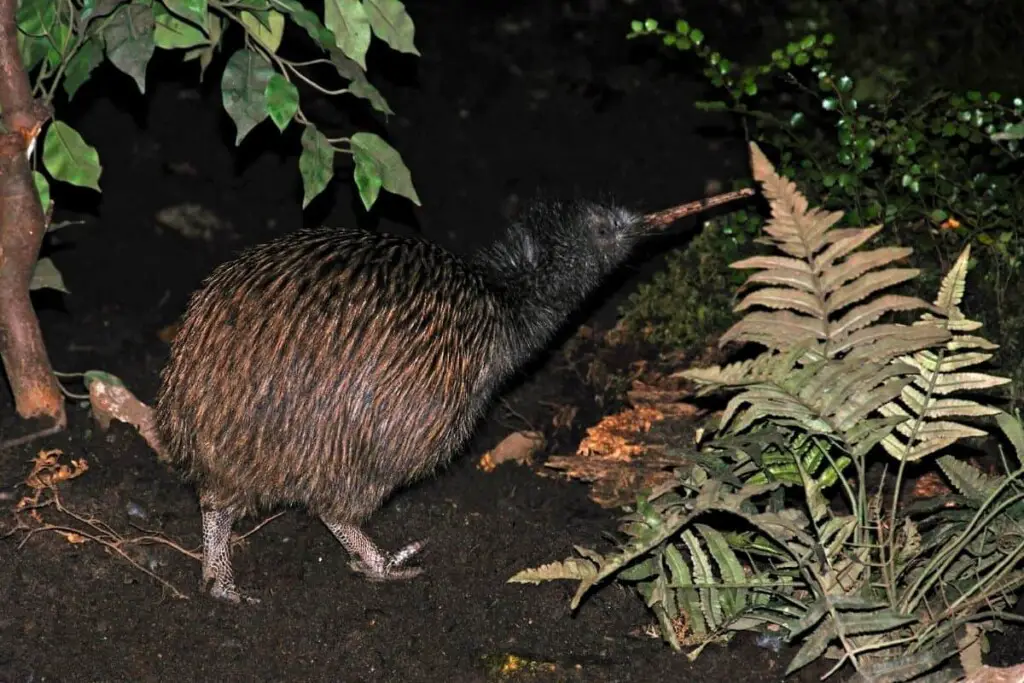
I would have been happy if this person could’ve given their name so that I could contact them to confirm this. As this was not the case, this shall remain just a load of hot air (pun intended).
Learn about another New Zealand bird that may be the oldest on Earth here.
Further Reading
If this post has sparked your curiosity for more information about bird behavior, you will definitely enjoy these other articles here on my blog:
- Why Do Birds Puff Up? – Will they explode?!
- Fish-Eating Birds – 10 Australian Birds That Just Love That Sushi
- How Long Do Birds Stay In The Nest – I have to know?!
References
- Question of the day – Do Birds Fart? – Laura Erickson PhD
- Does The Bassian Thrush Fart? – Afternoons With Jacinta Parsons ABC Radio Melbourne
- Outrageous Animals – Jeff Probst
- White’s Thrush: Some aspects of its ecology and feeding behaviour – J. S. L. Edington
- Birds – Robert Snedden
- Digestive Anatomy and Physiology of Birds – Richard Bowen
- A Gut Feeling. Feeding and Digestion in Birds – Andrew McKechnie
